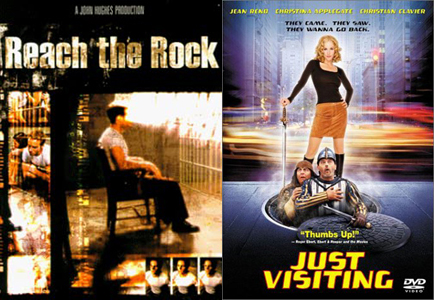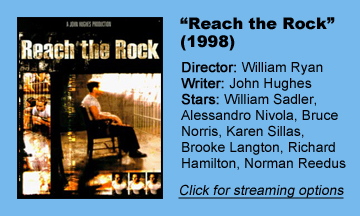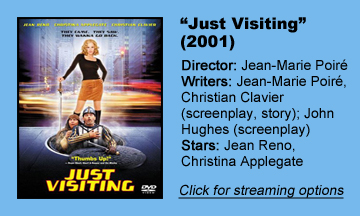John Hughes’ wholly original works tended to be better than his sequels, remakes and adaptations, and the last two films of his screenwriting career sharply illustrate this. (He also has two story-only credits remaining on his resume, which I’ll get to next week.)
“Reach the Rock” (1998) is his best late-career screenplay, and it’s not surprising to learn he wrote it about a decade before it got made. “Just Visiting” (2001), an Americanized version of a French hit, is among his worst late-career screenplays. It’s fair to say that Hughes was more invested in his original work, so it’s a shame there’s not much of that in the back half of his career.
“Reach the Rock” (1998)
The low-budget but engaging “Reach the Rock” is an adult companion piece to “The Breakfast Club” as 20-something troublemaker Robin (Alessandro Nivola, “Jurassic Park III”) gets thrown in the adult version of detention – jail – and squares off with Shermer, Ill., police sergeant Quinn (“Roswell’s” William Sadler).
Shades of early Hughes work
It’s tempting to go too far in comparing this to other Hughes works – linking Robin’s middle-of-the-night vandalism to Kevin McCallister’s creative traps, or imagining Robin as a continuation of troubled John Bender – but there’s no denying that “Reach the Rock” could almost translate to a stage play, as could “The Breakfast Club.”
The major difference is the music. Directed by William Ryan, “Reach the Rock” spends money on a strong B-list cast, and it sets an evocative mood of dead-quiet Shermer on a hot summer night before a storm rolls in. But the score is unusual and simple, sometimes with military-like drums, and the needle drops are sparse and forgettable.
Hints of thunder play in the background more than tunes. I think this might’ve been due to budget constraints, and it’s a shame because a well-chosen song might’ve been a clincher for this movie.
I enjoyed working through who these people are on the inside, even as they are doing the same for themselves.
Knowing Sadler as the decent sheriff on “Roswell” (I wouldn’t be surprised if this role got him the gig), I was taken aback by his cruel words to Robin, whom Quinn blames for the drowning of Danny (Norman Reedus, “The Walking Dead”) a few years earlier as the drunken friends tried to swim to a rock in the local river.
Hughes holds back information to provide intrigue. We know this is a town where everyone knows and affects everyone else, but he doesn’t spell out the precise relationships up front. This isn’t always for the sake of a twist.
But my initial assumption that Robin’s rebel-without-a-cause smashing of storefront windows stems from guilt over Danny’s death isn’t the whole story. Quinn and Robin are clichés on the surface who we know much better by film’s end.
Stiff direction
Ryan directs “Reach the Rock’s” breezy aspects too stiffly. Even as Robin sneaks out of his cell to do more vandalism, Quinn’s second-in-command, Ernie (a solid Bruce Norris, in a role that would’ve nicely fit Sam Rockwell), is up to antics of his own. He’s trying to make out with Donna (Karen Sillas), “the prettiest girl in town,” during his shift. It’s not boring, but it’s not as humorous as it could be.
Donna is an object if there ever was one, but Lise (Brooke Langton, “Melrose Place”) gets serious layers as Robin’s summer girlfriend. Giving us the flipside of the cliché, Robin is in love with Lise whereas she finds him convenient during her hometown visits. He’s two years older, but stuck, whereas she is moving forward in her lawyer career.
A jail-cell conversation between the two wonderfully digs into the layered reasons for why Robin and Lise see each other in certain ways. And previously, there’s a charged conversation between Quinn and Robin, and I love how a final revelation about the sergeant gives us a whole new perspective.
An analyst of Hughes’ writing would be unable to pin down his views on authority – he’s highly suspicious of principals (“Breakfast Club,” “Ferris Bueller”) but kinder to police, usually seeing them as incompetent but well-meaning (the “Home Alones”). This ambivalence serves him well in crafting Quinn.
“Reach the Rock” is listed as a comedy, and I think Hughes intended for a director to glean laughs out of Robin regularly sneaking out of his cell and Ernie trying to sneak moments with Donna. Instead, these beats are character-building at best, repetitive at worst.
Even so, the sparse direction emphasizes that this is a writers’ film. It would’ve been better if made a decade earlier with a bigger budget, but I’m glad “Reach the Rock” got made at all.
3.5 stars
“Just Visiting” (2001)
Certainly “Reach the Rock” is a hidden gem compared to the splashier Hughes films from around this time, including “Just Visiting,” a Chicago-ization of the French hit “The Visitors” (1993) that ended up being his last screenplay credit.
Nothing funny about this remake
The director, Jean-Marie Poiré (a co-writer of the original with Christian Clavier), and male leads – Jean Reno’s knight and Clavier’s peasant – return from the widely liked French version. I can’t definitively say that Hughes worsens the product, as I haven’t seen the original, but he obviously doesn’t improve it.
Perhaps the wildest gags are his, but regardless, almost nothing in “Just Visiting” is funny. It’s cued as a comedy from the start: In the “Princess Bride”-esque opening in the 12th century, the bad guy bumps his head on the door upon exiting a witch’s hut, for example.
“Just Visiting” has enough pace and energy – along with Reno’s easy charm — to make us think comedy might arrive, but it never does. Maybe the casting is partly to blame.
Normally, I’d have no problem looking at Christina Applegate, Tara Reid and Bridgette Wilson-Sampras for 88 minutes, but none of them fit in this film.
Applegate is the bland straightwoman, Julia, to Reno’s antics, as Thibault goes through the fish-out-of-water experiences you’d expect from a 12th-century transplant.
By telling this story mostly from the time-travelers’ POV, Poire allows us to see modern Chicago in a fantastical light, and we get mild amusement from Thibault tossing scraps to Andre as if he’s a dog. But at some point things need to get funnier than the duo washing their faces in the toilet.
Juliet shrugs it off; she thinks it’s a culture-clash thing with her French “cousin,” not a time-clash thing. But that’s odd, not humorous. More squirminess comes from the fact that Julia looks exactly like Thibault’s bride, Rosalind, so he sees her in a romantic light and she sees him as a cousin.
Unbelievable pairing
The romantic pairing of Reid, as gardener Angelique, and Clavier, as servant Andre, reminds me of community theater plays where the actors are miscast, but I forgive them because it’s a small town and they are making due with who shows up for auditions.
On the page, Angelique and Andre bond over being members of the servant class trying out a measure of freedom. On screen, it’s unbelievable that someone who looks like 2001 Tara Reid would give a short, older slob a second glance.
Wilson-Sampras’ Amber sticking with Matt Ross’ smarmy Hunter – who is also Julia’s fiancé – makes plot sense because Hunter aims to sell Julia’s family property (acquired via this “cousin”) and then run off with Amber.
But Wilson-Sampras is an accessory. Granted, some might say that’s an appropriate role for her level of acting talent, but c’mon, give her something to do.
With this cast, and the popularity of the original, and Hughes being a co-writer, I figured “Just Visiting” would be at the median level among Hughes’ adaptations of other people’s work – broad laughs amid fun but obvious premises.
Instead it challenges “Flubber” for the bottom of the barrel. The laughs don’t make the journey through time or across the pond.
2 stars




